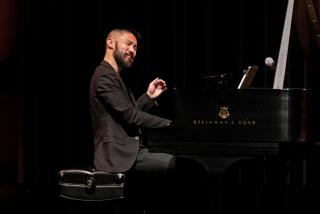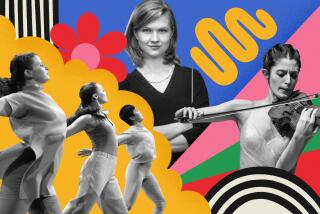Jorge Bolet; Pianist Among Last of Romantic School
- Share via
Cuban-born Jorge Bolet, one of the last of the great romantic piano stylists, whose quiescent career was revived only a decade ago, has died of heart failure at age 75.
Bolet, who gave what proved to be his final concert last year in West Berlin and made his last recording in April, died Tuesday at his home in Mountain View, south of San Francisco.
Although Bolet was a child prodigy, widespread fame eluded the courtly, elegant pianist until he was in his 60s, when renewed interest in the music of Franz Liszt and other romantic composers resurrected what had been a relatively static career.
In the 1980s Bolet made more than two dozen recordings and gave more than 150 concerts a season. He was preparing for a worldwide tour to mark his 75th birthday when failing health forced him to give up performing.
He had undergone brain surgery in the summer of 1989 and never fully recovered.
Bolet, born in Havana, began piano lessons at age 7 and studied with several masters of the romantic style. As a youth he came to be admired for his technique and his interpretation of the 19th-Century and early 20th-Century repertory.
“There may be others who can play the notes, but Bolet, with his roots in an older tradition than most today . . . has a feeling for the line, the elegance, the suave sound, the tapered phrase of high romanticism that is virtually unmatched today,” Harold Schonberg wrote in a review for the New York Times in 1978.
Two years earlier, in the Los Angeles Times, music critic Daniel Cariaga had called a Bolet concert at the Ambassador College Auditorium “awesome.”
“His taste is impeccable, his technique sovereign, his command of the repertory masterful,” Cariaga wrote. “ . . . Yet his playing--which combines the best elements of spontaneity and control--may be the least self-indulgent in the entire pianistic world.”
Bolet was 12 when he received a scholarship to attend the Curtis Institute in Philadelphia. There he studied piano with such romanticists as Josef Hofmann and Davis Saparton and conducting with Fritz Reiner. Other teachers included Rudolf Serkin, Moriz Rosenthal and Leopold Godowsky.
The pianist made his professional New York debut in 1937. When World War II broke out, Bolet enlisted in the Cuban army, serving in the Cuban Embassy. He later joined the U.S. Army.
After the war, he was stationed in Japan, where he produced the Japanese premiere of Gilbert and Sullivan’s “The Mikado.”
Bolet, a tall, striking man with dark eyes, hair and mustache, then resumed his concert career. He gave the premiere of Norman Dello Joio’s Third Piano Sonata, John La Montaine’s Pulitzer Prize-winning Concerto for Piano and Orchestra and Joseph Marx’s “Romantic Piano Concerto.”
Bolet also recorded the piano soundtrack for “Song Without End,” a movie about the life of Liszt.
But that was in the era of the modernists, and artists such as Bolet were considered flashy and tawdry. Pianists, he said of those years, were rated on Beethoven, not Brahms.
But he persisted, and his concerts continued to reflect his old-fashioned, many-faceted talents, which he used primarily in the piano liturgy of Brahms, Schubert, Chopin, Rachmaninoff and Scriabin.
Bolet taught at Indiana University from 1970 to 1977, then returned to the Curtis Institute, where he headed the piano department from 1977 to 1986.
“Use your imagination,” he constantly told students. “Make the music sing and grow.”
In person he was an imposing presence. Mildly profane, with a sardonic sense of humor, he once was described by Clavier magazine as “having swallowed deeply the spirit of Franz Liszt (and) rejoined mortals as an ambassador from the age of nocturnes and nightingales.”
In the 1980s, Bolet completed more than two dozen recordings with London/Decca Records, including nine of the piano works of Liszt. Bolet also recorded music by Brahms, Grieg, Rachmaninoff, Schumann, Tchaikovsky and Debussy.
Reflecting on his long and often arduous career, Bolet said in a 1984 interview with The Times that only the accolades had kept him going all those years.
“The only big reward for all the effort is the applause of the audience. It makes all the other nonsense bearable,” he said.
Bolet is survived by two brothers and a sister. A memorial service is pending.
More to Read
The biggest entertainment stories
Get our big stories about Hollywood, film, television, music, arts, culture and more right in your inbox as soon as they publish.
You may occasionally receive promotional content from the Los Angeles Times.










